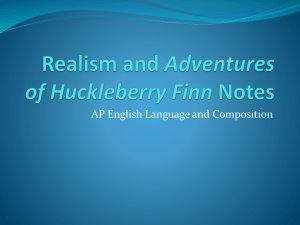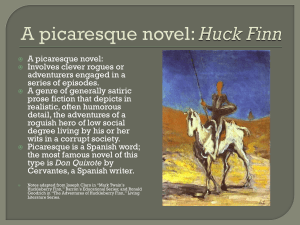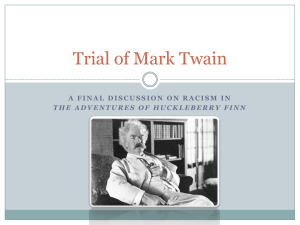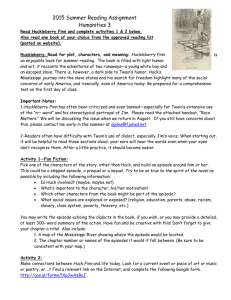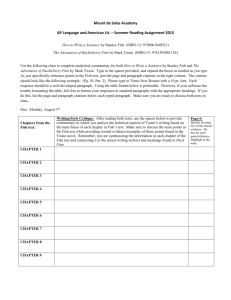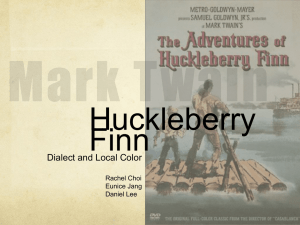Peer Review - Oak Ridge Schools
advertisement
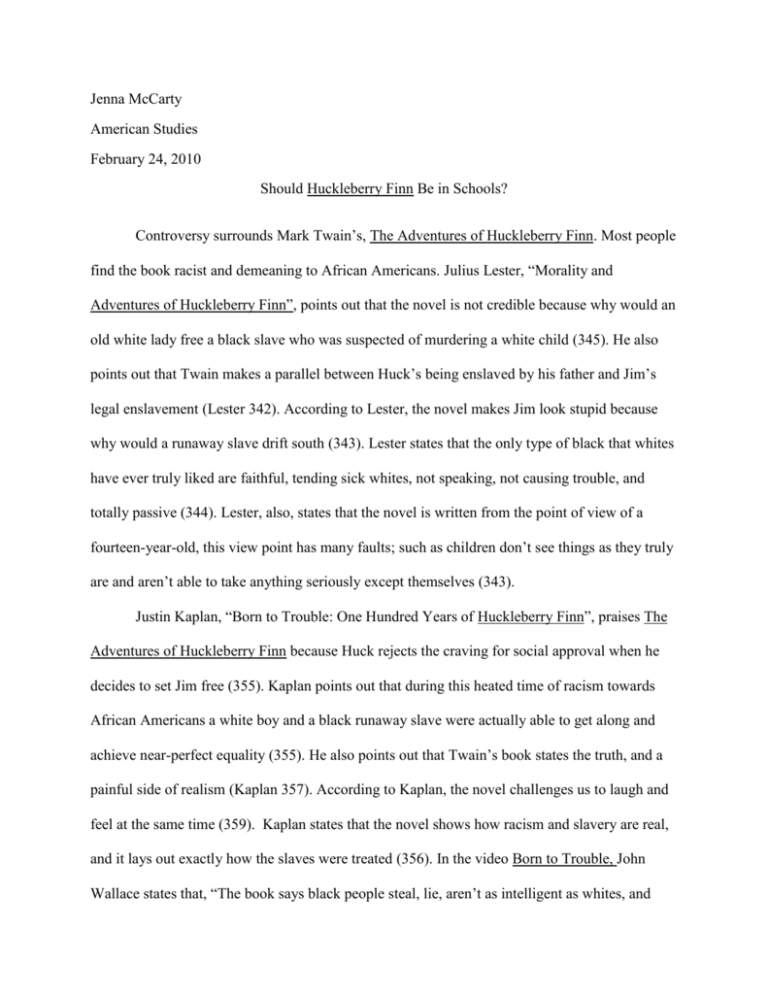
Jenna McCarty American Studies February 24, 2010 Should Huckleberry Finn Be in Schools? Controversy surrounds Mark Twain’s, The Adventures of Huckleberry Finn. Most people find the book racist and demeaning to African Americans. Julius Lester, “Morality and Adventures of Huckleberry Finn”, points out that the novel is not credible because why would an old white lady free a black slave who was suspected of murdering a white child (345). He also points out that Twain makes a parallel between Huck’s being enslaved by his father and Jim’s legal enslavement (Lester 342). According to Lester, the novel makes Jim look stupid because why would a runaway slave drift south (343). Lester states that the only type of black that whites have ever truly liked are faithful, tending sick whites, not speaking, not causing trouble, and totally passive (344). Lester, also, states that the novel is written from the point of view of a fourteen-year-old, this view point has many faults; such as children don’t see things as they truly are and aren’t able to take anything seriously except themselves (343). Justin Kaplan, “Born to Trouble: One Hundred Years of Huckleberry Finn”, praises The Adventures of Huckleberry Finn because Huck rejects the craving for social approval when he decides to set Jim free (355). Kaplan points out that during this heated time of racism towards African Americans a white boy and a black runaway slave were actually able to get along and achieve near-perfect equality (355). He also points out that Twain’s book states the truth, and a painful side of realism (Kaplan 357). According to Kaplan, the novel challenges us to laugh and feel at the same time (359). Kaplan states that the novel shows how racism and slavery are real, and it lays out exactly how the slaves were treated (356). In the video Born to Trouble, John Wallace states that, “The book says black people steal, lie, aren’t as intelligent as whites, and McCarty 2 aren’t human; any book that says this is a racist book (Born to Trouble).” While Nancy Methelis thinks that, “Language is difficult to deal with and teachers have to be sensitive to problems (Born to Trouble).” Should Oak Ridge Schools require students to study The Adventures of Huckleberry Finn? In order to understand whether the schools should teach Huck Finn we must first understand how teachers should go about selecting books. The National Council of Teachers of English (NCTE) thinks that, “English teachers should consider the contribution which each work may make to the education of the reader, its aesthetic value, its honesty, its read ability for a particular group of students, and its appeal to adolescents (“Guideline on The Students' Right to Read”).” Teachers have to choose books that would actually interest their students. Kids will not want to read a boring book; the books have to be exciting. Some teachers choose the books they teach by if they like them and that’s okay, but it doesn’t matter what the teacher thinks all that matters is what the students think. “The teacher selects, not censors, books (“Guideline on The Students’ Right to Read”).” The NCTE defines selection as that “it implies that a teacher is free to choose this or that work, depending upon the purpose to be achieved and the student or class in question, but a book selected this year may be ignored next year, and the reverse (“Guidelines on The Students’ Right to Read”).” Censorship, NCTE defines, “implies that certain works are not open to selection, this year or any year (“Guidelines on The Students’ Right to Read”).” “One of the most important responsibilities of the English teacher is developing rapport and respect among students (“Guidelines on The Students’ Right to Read”).” No matter what the teacher decides to teach they should do it in a respectable matter. We should teach books that educate and contain a character that we can look up to. McCarty 3 Huck educates and contains a couple of worthy characters. Huck Finn teaches us about slavery and what it was like to be a slave. In The Adventures of Huckleberry Finn, Twain wrote, “They cussed Jim considerable, though, and give him a ouff or two side the head once in a while, but Jim never said nothing, and he never let on to know me, and they took him to the same cabin, and put his own clothes on him, and chained him again, and not to no bed leg this time, but to a big staple drove into the bottom log, and chained his hands, too, and both legs, and said he warn’t to have nothing but bread and water to eat after this till his owner come, or he was sold at auction because he didn’t come in a certain length of time, and filled up our hole, and said a couple of farmers with guns must stand watch around about the cabin every night, and a bulldog tied to the door in the daytime; and about this time they was through with the job and was tapering off with a kind of general good-by cussing (275).” Huck’s character really begins to shine when he decides to fully help Jim even if he had to suffer because of it, “All right then, I’ll go to hell (Twain 210).” Many people think that Huck Finn is a racist book and even though Twain refers to African Americans as “niggers”, he didn’t write the novel to offend anybody. Mark Twain wrote The Adventures of Huckleberry Finn to show how moronic southerners were. The purpose of African Americans in life years ago was to tend to their masters, right or wrong this is how it was (Lester 344). African Americans shouldn’t be offended by this novel, they should be happy that someone actually had the courage to write about the true nature of slavery. Lester also points out that Twain shouldn’t have written Huck Finn from a fourteen-year-olds perspective, but if he didn’t none of the adventures would have happened (343). Justin Kaplan states that Huck Finn, “derives from a commitment to truth-telling and to a frequently brutal, painful realism” (357). McCarty 4 People who didn’t own slaves didn’t realize how they were treated ( Kaplan 356). Huck Finn showed the world what living in the south was like for African Americans (Kaplan 356). This novel showed that whites and blacks could live together and get along (Kaplan 355). Huck was the only white person in the book who saw Jim as a person and not just a piece of property. Huckleberry Finn is an individual, he went against society to do what was right (Kaplan 355). These are the kind of things we should teach in schools. In Born to Trouble, Julius Lester and John Wallace are against the novel because they believe that it is a racist book, “The book represents the white male psyche in it’s most adolescent form” but obviously Twain used Huck Finn to put down slave owners (Born to Trouble). Oak Ridge Schools should teach The Adventures of Huckleberry Finn because it educates and gives us someone to look up to. Even though this novel doesn’t intentionally offend people, it still does offend. Teachers should explain to their classes that Twain doesn’t use “nigger” to dehumanize African Americans, but to show how stupid slave owners are. If a student does have a problem with the book, even after the teacher explains this, then they should provide an alternate assignment for the student. Another policy the teachers should advocate is to not read “nigger” in class, this could cause problems for the teacher and the school. The school should have workshops for English teachers on how to handle students and parents who are insulted by the novel. The biggest thing that the teacher should remember is that people will be offended, and the best thing that teachers should know is how to deal with it. McCarty 5 Works Cited Born To Trouble. WGBH Educational Foundation. 1999. VHS. “Guideline on The Students' Right to Read”. National Council of Teachers of English. April 2009. February 12, 2010. Web. Kaplan, Justin. “Born to Trouble: One Hundred years of Huckleberry Finn.” Adventures of Huckleberry Finn. Ed. Gerald Graff and James Phelan. New York: Bedford, 1995. Lester, Julius. “Morality and Adventures of Huckleberry Finn.” Adventures of Huckleberry Finn. Ed. Gerald Graff and James Phelan. New York: Bedford, 1995. Twain, Mark. The Adventures of Huckleberry Finn. Logan, Iowa: The Perfection Form Company, 1979. Print.
